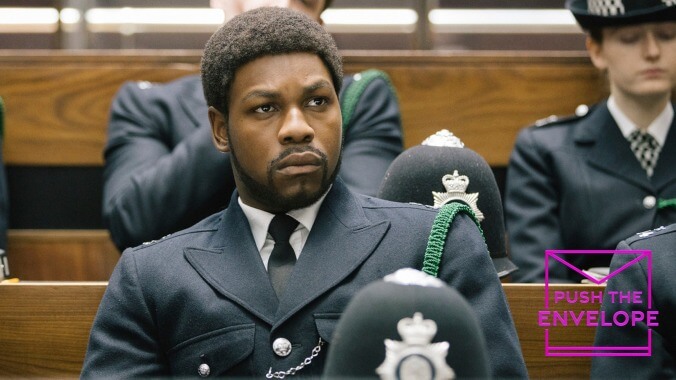John Boyega on bringing his activism—and a Star Wars reference—with him to Red, White And Blue

John Boyega has become a vocal advocate for social justice, most recently making headlines for criticizing the way characters of color were handled in the recent Star Wars films. Now the actor is bringing the conversation of equality to the screen in his installment of Steve McQueen’s new anthology film series Small Axe. In Red, White And Blue, Boyega stars as Leroy Logan, one of the first Black officers in London’s Metropolitan Police Force. Facing adversity from all sides, Leroy (who, in real life, eventually rose to the rank of superintendent in the Met) grapples with the disapproval of his father, who was previously assaulted by local police, as well as the racist attitudes of his fellow officers, who make it abundantly clear they don’t have his back.
In anticipation of Red, White And Blue’s debut on Amazon Prime on December 4, Boyega spoke with The A.V. Club on this week’s episode of Push The Envelope. He discussed his advocacy, how much he identifies with Leroy, and moving on from Star Wars (even though the franchise followed him in a small way to Small Axe). You can read a few highlights from the conversation below, or listen to the full interview. This week’s episode also features a talk with Sound Of Metal’s Riz Ahmed.
John Boyega: I see them as five films, just because of the quality and what Steve [McQueen] has done with this. Essentially it’s five films that go into the experiences of Black Caribbean people in the U.K.—through various obstacles and challenges in a London and in a Britain that’s not necessarily ready for that kind of representation. In my specific film, Red, White And Blue, I play Leroy Logan, who is a scientist-turned-police officer who wants to go into an institution and obviously change it from the inside. And that stands as one of the biggest challenges of his life. And Small Axe really—a strange, unique format created by Steve McQueen—joins all these different stories together to give us just a really good, dynamic insight into British history.
The A.V. Club: What made this the right project for you to sign on for immediately after completing the Skywalker trilogy?
JB: When Steve approached me, I was just done with the franchise. So I was like, “This is perfect.” You know, “I’ve been looking for something to do. I’m at the crossroads now when it’s kind of like what’s next? And the healthiest thing for me to do is definitely to be a part of something and partner up with somebody that I definitely creatively trust.” So it was definitely a no-brainer for me.
AVC: Your character is treated as an outsider at work because of the color of his skin and in his community because of his job. He is constantly having to code-switch. Did you identify with that aspect of the character?
JB: I mean, you definitely transfer some experiences, some feelings from your own personal day-to-day into the role. But the intensity of Leroy’s time, and the intensity of being one of the founding fathers of representation within the [U.K. police], there’s some traveling to do, as I like to call it. And emotionally it’s quite draining to see that he was always navigating in such a space that wasn’t welcoming. Before we’re put into positions on set, most of the other police officers would be in their big groups, you know, about five or six of them feeling like they had a sense of partnership with each other, while the officers of color would be on the other side of the room, just by themselves and quite isolated and not really supported. And to actually sit, live, and breathe in those situations, you know. I don’t know how Leroy done it, because if it was me… But Leroy is just controlled and knows that there’s a goal that he’s working towards, and keeps at the centerpiece of his decision-making.
AVC: I don’t want to spoil it, but there’s a Star Wars reference in the film. Was that added once you were cast?
JB: No, it was always in it. And I was like, “Is that… Should I have a [reaction…] Nah. Whatever. It’s cool.” And it just stayed in. But people liked it at the festival. I was like, “Oh, wow. Okay. Cool. People like a little Star Wars reference over there.” It’s kind of cool.
AVC: Because you are an advocate, and you were active in the recent protests, and really have been using your voice to make sure that progress is being made, how freeing is it to have a project that allows you to do that both in your professional and private life?
JB: You know, it’s mad to have that, obviously. Now, if you do any kind of socially conscious project, people feel like maybe you met a director at the protests, and that’s why you got it. But what’s great is to know that Red, White And Blue filmed prior [to the protests this summer] and to know that it’s always been a passion of mine, but to see it reflected in reality is cool. It’s cool. I guess it’s also weird. It’s also very, very strange, because now you’re probably looking at scenes and thinking, “Well, that kind of looks too close to what’s happening in reality.” And it’s like, “I cannot believe now that reality is that dramatic.” So it’s an interesting, interesting thing.
Subscribe to Push The Envelope for new episodes every Thursday, and remember to rate and comment as well.